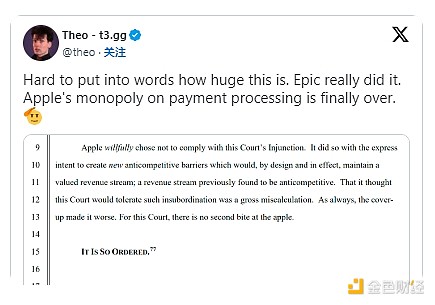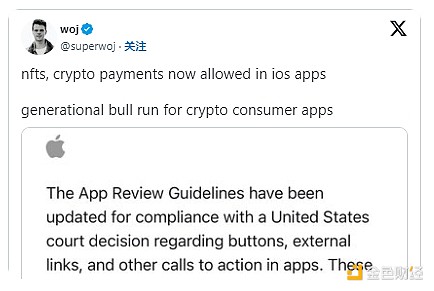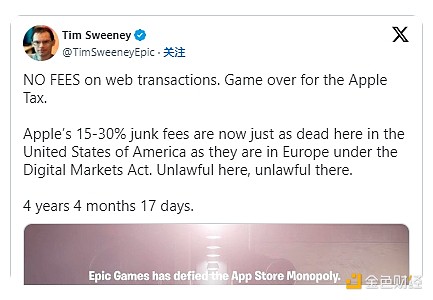Source: Bankless; Compiled by: Tao Zhu, Golden Finance
What happens when the world's largest tech monopoly is taken to court by one of the most powerful studios in the gaming industry and ultimately loses? The answer is likely to change mobile development forever...
After nearly five years of legal battles, Epic Games forced Apple to rewrite the rules of the App Store. This not only brings huge opportunities for cryptocurrencies, but also brings a turning point for developers who have long been bound by Apple's walled garden: they are finally free to profit as they wish.
Today, we will take a deep look at Epic's multi-year legal battle and explore its far-reaching impact on mobile app developers.
Apple's Antitrust Clearance
In August 2020, Epic Games sued Apple, accusing the tech giant of anti-competitive behavior after removing Epic's popular multiplayer battle royale game "Fortnite" from the App Store.
At the heart of the dispute was Apple’s policy of forcing all in-app purchases to be made through the App Store and charging a whopping 30% commission on payments; a predatory policy that Epic Games had attempted to circumvent by launching its own in-game payment system.
While Apple eventually made a small concession by allowing developers to link to other payment options, the updated policy still required a 27% payment split with Apple and severely restricted how payments could be displayed in apps.
Neither side was willing to budge, but after nearly five years of protracted litigation, the U.S. District Court for Northern California finally issued a final ruling on the case.
In a scathing, eighty-page rebuke, Judge Yvonne Gonzalez Rogers ruled that Apple had willfully violated the law by erecting anticompetitive barriers designed to protect its multibillion-dollar App Store revenue stream.
In addition, she referred Apple and one of its vice presidents of finance to federal prosecutors, charging them with contempt of court for violating a previous 2021 injunction prohibiting anti-competitive pricing practices in the App Store.
While the 2021 injunction against Apple primarily challenged its arbitrary 30% commission, this latest ruling explicitly prohibits Apple from charging commissions on out-of-app purchases and controlling how developers communicate with users.

Golden Age of Cryptocurrency?
Apple was forced to update its App Store review guidelines for the United States in order to comply with Judge Gonzalez Rogers' ruling.
The revised guidelines not only remove any ban on external links, but also explicitly allow developers to display NFT collectibles to users. This marks a major victory for the emerging gaming industry in the cryptocurrency space, struggling on-chain artists, and others who are profiting from blockchain collectibles.
Most importantly, however, the updated guidelines exempt US apps from Apple's ban on external payment methods outside the App Store that can bypass its 30% revenue share.

Cryptocurrency payments are lauded for their nearly instant speed and extremely low cost. Previously, mobile app developers were limited to using approved, high-fee payment rails, but Apple’s recent court defeat clears the way for developers to use whatever payment methods they want!
In an age where mobile apps can choose how users pay, many cost-conscious developers will rationally abandon Apple’s “walled garden” and high fees in favor of other solutions.
Defaulting to App Store payments provides an undeniable convenience for app end users: they already have their payment information on file with Apple, and so may be reluctant to store sensitive financial information on a random third-party platform.
While large studios like Epic Games may find it worthwhile to independently develop a proprietary payment portal, for smaller studios, this new limitless environment provides fertile ground for stablecoin experimentation.
Instead of repeatedly loading their credit card information onto random websites and praying they’re competent enough to protect it, app users can make instant payments using any token in their crypto wallet, streamlining the payment process and ensuring a trustless experience for all involved.
In turn, developers can instantly access all of their funds (potentially stored in stablecoins) and focus on game development by outsourcing payment responsibilities to an on-chain economy built specifically for this purpose.
This is a truly compelling proposition for all parties, facilitating engagement between users and apps, strengthening the economics of mobile app development, and encouraging crypto payments to go mainstream.
The dust has yet to settle on Apple’s policy shift, but the door to mobile monetization has clearly been opened. In this new era, developers can build, monetize, and scale as they wish.
With seamless crypto payments on the horizon, the future of on-chain apps has never been brighter.

 Jasper
Jasper
 Jasper
Jasper Catherine
Catherine Clement
Clement Joy
Joy Aaron
Aaron Jasper
Jasper Kikyo
Kikyo Hui Xin
Hui Xin Jasper
Jasper Aaron
Aaron